#or mental health expert or even a medical doctor
Explore tagged Tumblr posts
Text
idk if anyone has had the balls to say it yet and im def not the one to put it eloquently as it deserves but im seeing some uneasy & alarming trends surfacing in the manifestation & self-help community that look like cult indoctrination
#like these people are vulnerable they hate their lives theyre depressed then some random guy comes in and claims to have all the answers#he says u can change things with the power of ur mind u think he's a genius u start to live ur life according to his teachings#sound familiar#meanwhile he's literally just some guy#not even academically qualified in the subject he claims to be an expert in and giving advice about#like i believe in it. but im not an idiot. i fact check these claims. i am healthily sometimes annoyingly skeptical#seeing ppl be like 'well nevill says u should do this and this' girl who tf is nevill#'dr joe says this can cure my anxiety' dr joe is a chairopractor my love hes not a psychiatrist or a professional neuroscientist#or mental health expert or even a medical doctor#he's some guy with a bachelors in biochem#there r so many guys with bachelors in biochem
4 notes
·
View notes
Text
"Canada’s legal criteria require a medical reason for euthanasia — a fatal diagnosis or unmanageable pain — but the committee’s reports show cases where people were euthanized based on other factors including an “unmet social need.”
AP’s investigation found doctors and nurses privately struggling with euthanasia requests from vulnerable people whose suffering might be addressed by money, social connections or adequate housing. Providers expressed deep discomfort with ending the lives of vulnerable people whose deaths were avoidable, even if they met the criteria in Canada’s euthanasia system, known nationally as MAiD, for medical assistance in dying.
“To finally have a government report that recognizes these cases of concern is extremely important,” said Dr. Ramona Coelho, a doctor on the expert committee. “We’ve been gaslit for so many years when we raised fears about people getting MAiD because they were poor, disabled or socially isolated.”
In the case of a man identified as Mr. A, Ontario’s expert committee questioned whether authorities tried hard enough to relieve his pain before he was euthanized. Mr. A was an unemployed man in his 40s with bowel disease and a history of substance abuse and mental illness. He was described as “socially vulnerable and isolated.” Some committee members were alarmed that a psychiatrist suggested euthanasia during a mental health assessment.
345 notes
·
View notes
Text
Reminder That System Medicalism is a Religion: Exhibit A, @theinfernalcollective

This is pretty typical sysmed rhetoric.
And in typical sysmed fashion, has no sources to back it up whatsoever! As always, sysmeds rely on an argument by assertion. Facts just aren't on their side.
Never have been, never will be.

So they give a couple sources.
First is the DSM which doesn't say trauma is needed in all cases of DID, only that it's associated with trauma. It makes no such claim for OSDD-1 being associated with trauma at all. And on top of that, doesn't even mention the word system. Which is pretty big since most endogenic systems don't have a dissociative disorder and don't claim to.
Basically, it's a nothing source that doesn't back up what they claim it does.
As for Dr Candy Fox...
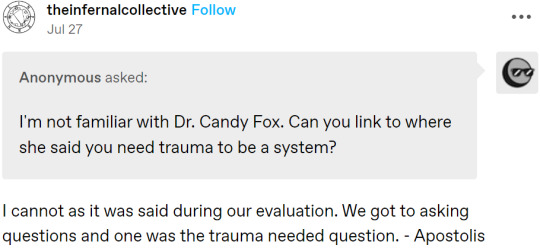
There's no evidence she actually said this.
And she has yet to respond to the message I sent her website. (Because yes, I did send her a message on her site to see if she actually agreed with this.)
But based on the context, it seems pretty obvious she would have been talking about dissociative identity disorder, not "being a system."
Now, before going any further into this conversation, let's take a step back and remember The Infernal Collective asking the anon to name a single psychiatrist, obviously expecting they wouldn't be able to.
How did THAT go?

Oh right, it's how it always goes when you meet a sysmeds' goalposts!

Did you expect anything different?
"This psychiatrist saying you can be plural without trauma doesn't count because he's talking about transgender people."
"And also the screenshots of his peer-reviewed book that was published by the American Psychiatric Association are posted on a site I don't like."

So when linked to an email from a dissociative expert, someone with 40 years of experience treating dissociative identity disorder, they again retreat to just... not liking the website the image is posted on?
And again, their source for Dr. Candy Fox was just something they allegedly heard in person during evaluationMeanwhile this is an actual email, with one of the foremost DID experts in the world!
Also, for the love of the gods, Transgender Mental Health does NOT say "transgender make plurality." Actually read the thing!!!
But hey, now that I'm done with that particular conversation and got what I need to make my point, I'll confess! All these anons were me!

Reminder, again, their source was "my doctor said it, trust me bro!"
And while I only named a couple doctors over the course of that conversation, I could have dropped so many more!
The fact is, it's not hard to look at a link and read the screenshots therein. Here, I'll even post the pics!
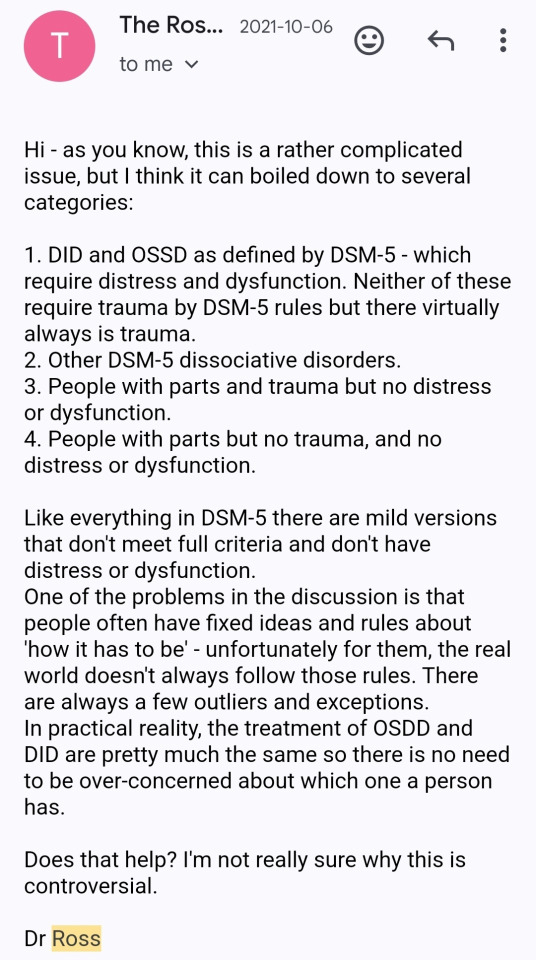
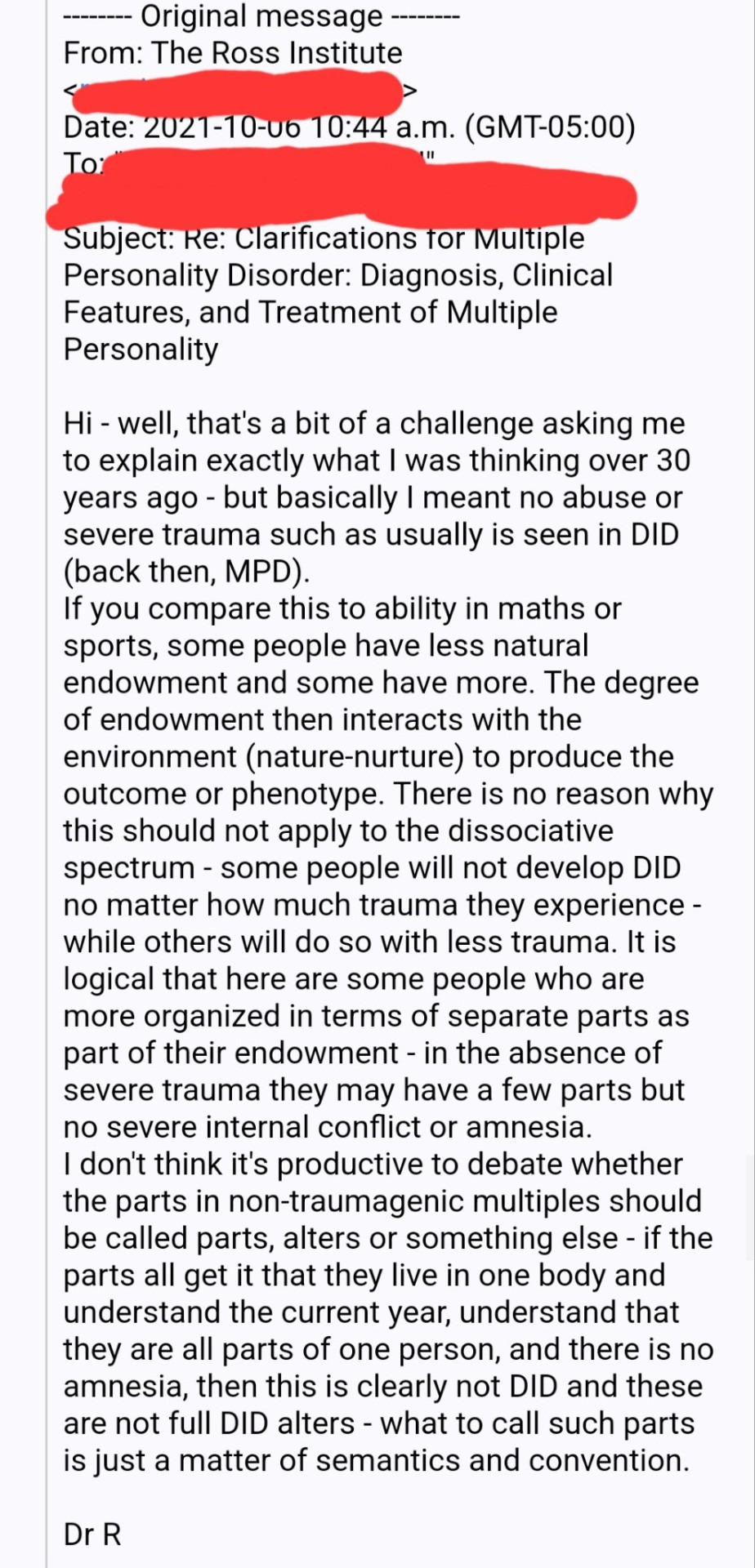
And in case you're thinking that they just trust Dr. Candy Fox's opinion so much and hold her in such high regard...
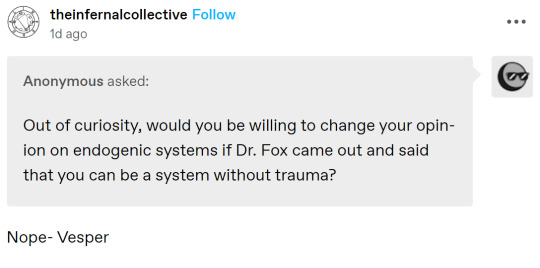
Nope.
But then...
WHAT THE HELL ARE YOU BASING YOUR BELIEFS ON?
Because it's not psychiatry. You can't cite a single doctor anywhere who has said you can't be a system without trauma!
System Medicalism is a Religion!
Sysmeds, like transmeds, do not base their bigotry in science or rationality. They do not follow the opinions of experts.
It's a religion to them! The Church of the Holy Trauma believes that Trauma and only Trauma has the might to bestow plurality upon the few chosen. And their faith is so unshakable because they've been told this by random uneducated nobodies on the internet, and it just feels true.
And because their FAITH in this idea is so strong, no amount of studies will change their mind. No amount of doctors coming forward to support endogenic systems. No amount of literal brain scans will convince them endogenic systems are real. As the saying goes, you can't reason someone outs of a position they didn't reason themselves into in the first place.
In the end, sysmeds continue to be an anti-science hate group with a religious devotion to their ideology of hate.
And this whole disaster is just another example of that.
#syscourse#pro endogenic#pro endo#systempunk#syspunk#system punk#multiplicity#endogenic#systems#system#sysblr#plural#plurality#actually plural#actually a system
125 notes
·
View notes
Text
This will be written sloppily due to me being stuck on my phone but the report today got me talking to a friend and reminded me of a theory I had (I think it originated from @archivalofsins though)
Still, I'll share it again for fresh eyes:
I think Shidou could be making Mahiru sicker instead of helping her
So the gist is that at the start of trial 2, Mahiru was in a critical condition and had her life saved by Shidou
After that she entered a period of injury but stability
We saw through timeline conversations that she was in pain but seemingly able to move around and do things with some assistance
Yuno then gifted Mahiru a wheelchair, the clear implication being that this would let her continue to live as she had been but without as much pain (ambulatory wheelchair users often talk about how their chairs give them more energy/spoons to do other activities too)
Similarly, in Shidou and Mahiru's voice dramas they discuss her health but there doesn't seem to be the kind of urgency suggesting that Mahiru needs to be immediately moved to a hospital in order to not die (Shidou tries to ask Es to "end milgram" but if Mahiru was going to die without urgent care that could've helped his case yet he didn't mention it, even in normal prisons if a prisoner is severely sick or injured they're supposed to be taken to a hospital [not to say real prisoners don't experience medical neglect or abuse but officially they aren't meant to] )
At most he brings up the idea that another guilty vote could be detrimental to her mental health -but he's not an expert or anything
As I said, this all painted a picture of Mahiru as injured but stable until her next verdict
And we forgave her
But then things take a turn
Suddenly Mahiru is requiring round the clock care
Shidou can barely stop for a birthday shoulder rub. Yuno is taking breaks during Mahiru's naps
She appears to be bedridden and her wheelchair hasn't been mentioned since she got it
If we accept time doesn't move in milgram that could explain injuries not healing but it would explain such a dramatic, unexplained decline
We know Shidou has built his personality around being a doctor. A necessary figure who saves people's lives. So it would be a little awkward if he didn't have any patients (since Fuuta apparently didn't feel like he could rely on him and instead joined the anti medicine cult, a common pattern in those who lose trust in doctors after being mistreated)
I don't think Shidou is evil (although it's pretty bad to poison your patients) I think this doctor-patient relationship is almost co-dependant for him, after all its what his inno vote is based on.
It does leave him in a vulnerable position though
He's potentially turned one person mostly able to look after themselves with some medical assistance/supervision into a patient that even with 2 people is causing him to be spread thin
If Mahiru dies he'll be blamed (and I'm sure Yuno is watching him if he does anything too suspicious)
But if another incident happens before T3 and a lot of people get injured again
Or Amane incapacitates him, preventing him from treating the others
There could be a pile up of casualties with not enough people to look after them all
Hard decisions may have made
It could be a triage
#shidou kirisaki#mahiru shiina#milgram#ミルグラム#milgram theory#not really but putting it there anyway#my backup theory is still that they're hiding a baby but i think this is more likely
77 notes
·
View notes
Note
"Therapists also don’t diagnose you." The fuck? It varies by state? Any therapist should know this?
Should, but i doubt the claim to start with, so I'm not shocked
For anyone confused, therapist isn't actually a title, it's a service
Anyone can offer the service, to varying degrees, EVEN PEOPLE WITHOUT LICENSING, and the title is your education
For example, an MSW can be a therapist, or they can be a civil worker, psychiatrists can offer therapy even though they typically specialize in diagnosis and medication management, there's counsellors, peer support workers, SW and SSW, psychologists-- all of these can be therapists, but not all can diagnose and treat
Titles capable of diagnosing will vary state by state, province by province, country by country, and so will the services they're allowed to provide
Always look up what letters your therapist uses and what they're allowed to do in your city-- this is called their "scope of practice", what they're allowed to do, based on their education and licensing board
Let's look at a random example so you can see what to look for
Pretend we're looking for a trauma therapist in New York

LMSW
The Licensed Master Social Worker has advanced training, a graduate academic degree, has had supervised clinical work experience, and has passed a national- or state-certified licensing exam.
Now back to Google
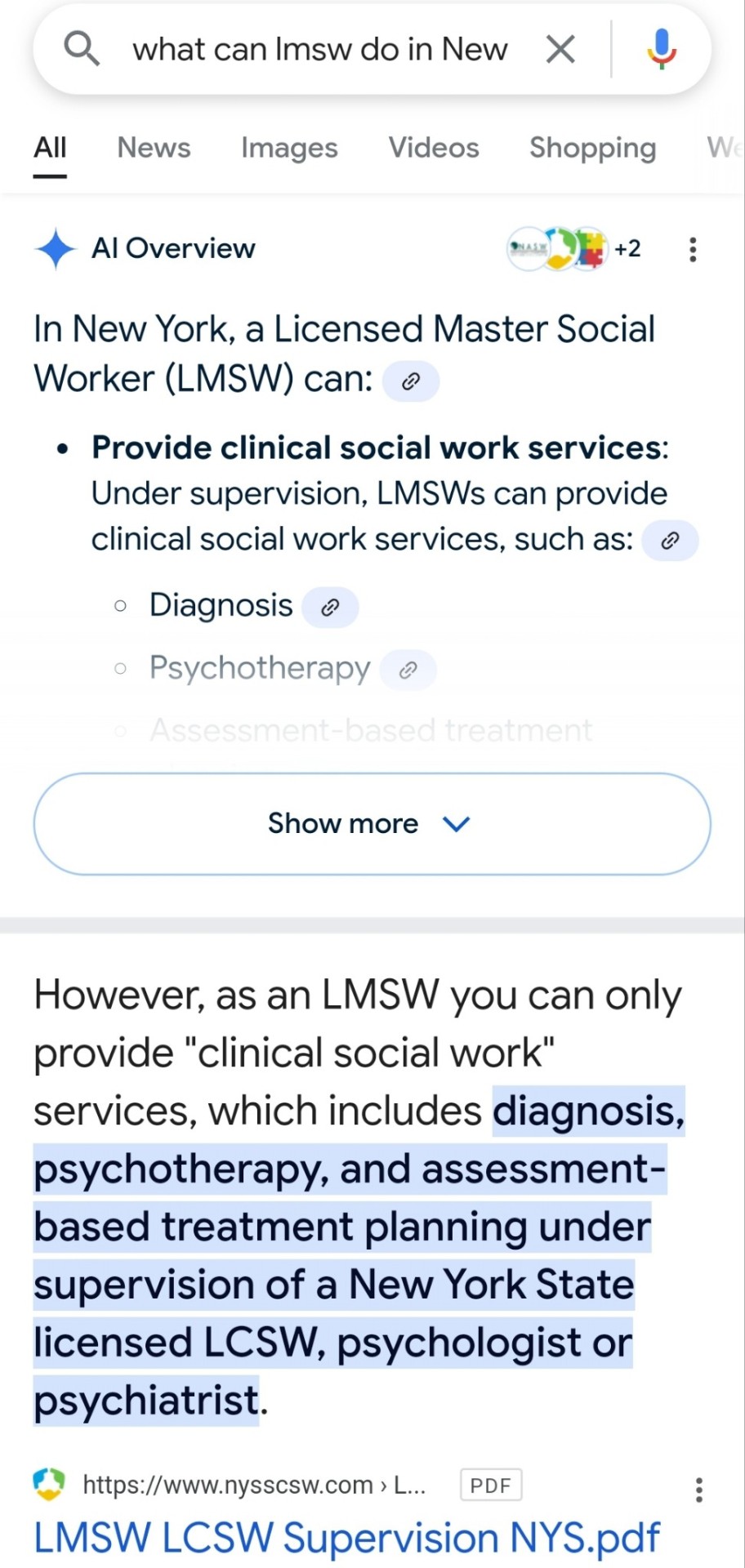
What about....

PsyD
The Doctor of Psychology, PsyD, is an applied clinical doctorate that emphasizes the application of psychology in a wide range of clinical settings to promote mental health. Training typically lasts between 4 to 7 years and includes 3 to 4 years of supervised clinical work experience. An individual who earns a Psy.D. in clinical psychology from an accredited program may become licensed to diagnose and treat mental disorders, conduct assessment and complete psychological evaluations, present expert testimony, and provide psychotherapy.
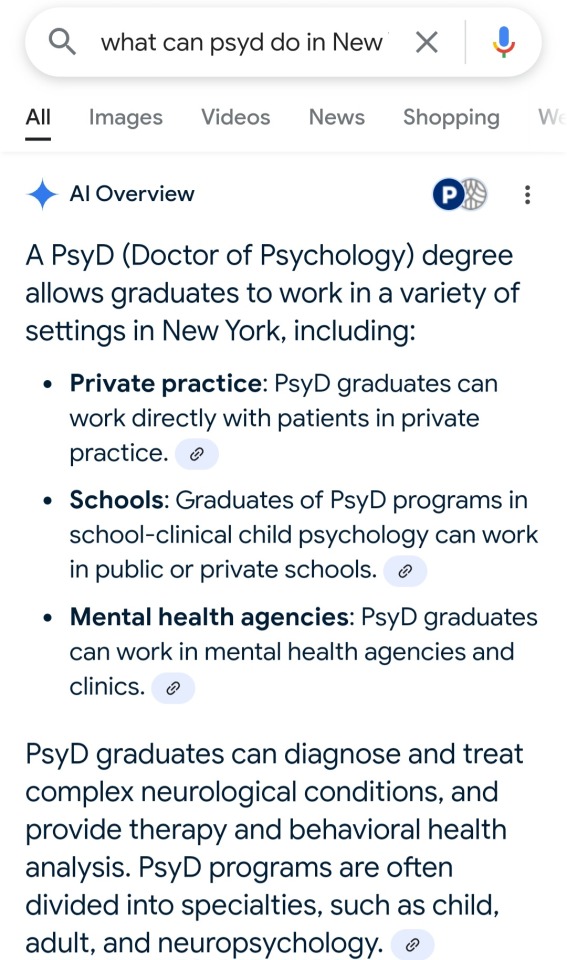
ALWAYS, ALWAYS, ALWAYS understand what your "therapist" is legally allowed and not allowed to do
Peer support workers, in most countries, don't even need formal education, let alone any kind of licensing. They assist based on lived experiences in informal settings. In clinical settings, they act more administrative than anything. Due to this, any kind of misconduct is extremely hard to prosecute.
Remember, Google is your friend, use it.
#syscourse#the more you know#pro syscourse conversation#choosing a therapist#check those sexy little letters
39 notes
·
View notes
Text
[“Libbon (2007: 86–87) highlights that the verve of patriarchal science to prove sex role differentiation throughout the nineteenth century correlates with the increasing dissatisfaction and protest by women against such gender demarcations. As the century progresses, the “woman question” becomes a popular topic of debate across Europe and America, and the developing profession of psychiatry comes to play a more prominent role in reinforcing the morality of “appropriate” gender roles. For example, Darwinian psychiatry of the 1870s proclaimed women as less evolved than men due to their physiology; the dominance of the reproductive system meant that the female brain was largely incapacitated, thus women were theorised as “naturally” reliant and submissive to the superior male race (Showalter 1985: 121–125). Psychiatric scholars argued that there was a danger of insanity if women sought to exert additional pressure on the brain through seeking an education or considering political matters. Even the simple activities of writing or reading could be potentially disastrous to a woman’s health, as can be seen from the following advice given to prominent feminist writer Charlotte Perkins Gilman (cited in Ehrenreich and English 2005: 112) by her doctor in the latter part of the nineteenth century:
Live as domestic a life as possible. Have your child with you all the time … Lie down an hour after each meal. Have but two hours intellectual life a day. And never touch pen, brush or pencil as long as you live.
Feminists became a prime target for the psychological sciences; such women were theorised as degenerative, sexually deviant and a threat to the “natural order” of the species (Libbon 2007: 86–87). According to the famous sexologist Krafft-Ebing, the dangers for women of abandoning their prescribed sex role were becoming “too masculine” as well as sexually permissive, both of which could be considered as regressive and pathological—symptoms of underlying organic damage to the female body (Libbon 2007: 87). Under the patriarchal ideology of the experts of the mind, mental disorders such as nymphomania, hyperesthesia (a mental illness caused by “oversensitivity”), and hysteria became commonly associated with those women who dared to deviate from the strict confines of Victorian femininity and their ascribed domestic chores. Thus, the dominant discourse on the division of labour and gender roles in industrial society was legitimated and reinforced by the burgeoning psy-professions as normal, common sense, and healthy for society. “Mental breakdown,” remarks Showalter (1985: 123), “would come when the women defied their ‘nature,’ attempted to compete with men instead of serving them, or sought alternatives or even additions to their maternal functions.”
The increased labelling and confinement of women as “mad” by psychiatry served to legitimate the needs of capital and patriarchy for subservient and conforming women under the discourse of medical science.
Here, we see the development of what would become the hegemonic domination of female populations by psychiatry and its allies—professional groups that have sought to depoliticise the struggle against patriarchal power through medicalising women’s bodies and experiences as pathological. As Libbon (2007: 89) summates of psychiatry’s success in the nineteenth century,
Having labelled woman as intrinsically diseased and debauched, experts and laymen alike now took institutional measures to impede any further social or political disruption on her part. Under the guise of “curing” her of her ailments and moreover protecting society in the process, the unruly woman was now forced either into compulsory hospitalization, often with accompanying surgical mutilation, or incarceration. In both instances it was the woman who protested and rallied against male control and regulation of herself and her body who was locked away, sequestered from society, in an effort to compel her to return to … the silent, submissive role man had eked out for her.”]
bruce m.z. cohen, from psychiatric hegemony: a marxist theory of mental illness, 2016
32 notes
·
View notes
Note
I’ve thought of another route after the asylum ending: where Francis develops schizophrenia after Nacha and Anastacha cut him off. I’m no mental health expert but after doing a bit of research this is what I could come up with so if there’re any inaccuracies, my bad. Francis is completely isolated and locked up in his white room. He’ll never see his wife and daughter again after he kidnapped them and forced them to love him. When they told him they don’t love him anymore, it ultimately broke him. He can try all he wants to escape but he’s all locked up. And now his spirit is so broken that he didn’t have the will to live or find them anymore. Francis spends the rest of his days crying, calling out for Nacha and Anastacha to come back to him or lie down on his bed in a listless catatonic state. Francis won’t eat or take his medication even if the nurses ask him to.
He will create a world where he’s still with his family again, before everything went downhill. He and Nacha are still in love, she fully supports him and cooks him his favourite meals. Anastacha still loves him as a father. He still gets to hug her and say “I love you to his family.” He will create scenarios where they all lovingly spend time together like the park, the pool, the beach, anywhere as long as he gets to spend his every waking moment with them. What Francis isn’t aware of is that he’s actually all alone and that he’s just talking to the walls.
The psychiatrists and detectives observed Francis’s strange behaviour of hearing voices, talking to himself, his catatonia, etc, however since mental health care wasn’t the best so I don’t believe they know how to deal with it. During Francis’s sessions with his psychiatrist, if they try to shatter his perfect delusions, Francis will break into hysterical sobs and will frantically attack his psychiatrist shouting, “No you’re wrong! My wife loves me! My daughter loves me! We’re happy together! I know they love me! We’re in love!”
Francis’s memories will get blurry but if his psychiatrist questions Francis about his past or show something that will trigger any of his awful memories like a pot of hot tea or cigarettes, Francis will become more unstable and will have a mental breakdown, shrieking in fear as vague memories of his father abusing him or his mother psychologically abusing him comes back. Once again the medical assistants have to restrain him.
Eventually, Francis’s delusions would evolve to him regressing into a time when he was still with his mother. Even though his last memories with his mother was traumatic, he still held some love for her and Francis wanted to go back to a time where his mom still loves him.
“Mommy…mommy…” Francis muttered like a sad little boy asking for his mother’s affection, “Mommy…I’m tired… mom…can I ask for a hug… dad’s being cruel again… mom… can you tell me a story…”
He would go from crying fits to happy childlike giggling and vice versa. Soon his delusions would combine where all the three people he loves the most in his life come together as one happy family. He wouldn’t have to experience sadness and loneliness again as long as he has his mother, wife and daughter with him. Sometimes Angus appears as this weird uncle figure/good friend because a part of Francis still cares for him in a morbid way. This shows who Francis is at his core. He was an extremely traumatised and lonely child who went through so much abuse that it turned him into a monster that hurts people yet buried his emotions deep within himself. Everyone in his life abandoned him, including his own family. If no one could truly love him, what else can he do other than create a world where he’s happy with the ones he loves?
After years of being locked up in his padded cell, Francis Mosses is no more. He lost any semblance of what’s left of his former self. All that’s left of him is an empty shell drowning in his own hallucinations and delusions of the comfort of his made up happy family. The doctors would either lobotomise him or wait until the day of his execution.
As the day of his execution comes, Francis will savour his final meal of beef stew and strawberry cheesecake as he cries because it’s tastes just like home, how Nacha made his meals, where he and his family would sit down to have a quiet family dinner together. When Francis is strapped to the electric chair, he could barely make out his surroundings but he thought he saw his wife and daughter at the front stands (and possibly Angus at the back). When the executioner asks for his final words, all Francis could say is, “Nacha…Ana…where are you? I still love you…” before finishing the job.
Angus could only hide the sadness in his eyes with his hat. Even though he’s angry that Francis got himself caught, he still sees him as a friend and a part of him misses him. Nacha and Anastacha are crying into each other’s arms for support. All of their source of trauma is finally over. Despite everything Francis put them through, they don’t truly hate them as they thought they would. They still felt some sympathy for him but nothing could put weight the grief they caused them. Both mother and daughter stuck to each other after the execution since they only have each other now and they’ll learn how to cope with this together.
~ SK Francis anon 🔪
This is definitely one of the worst and saddest endings of the SK fanfic. When he is hallucinating about his family, it reminds me of Alice: Madness Returns, there the protagonist created her own world of imagination.
I can also see that in spite of the trauma SK Francis had inflicted on them, there still part of Nacha and Anastacha that still care for him. They know its a wrong feeling but he has never been physically abusive to them, nor dropped his duty of being husband and a father. They are financially stable thanks to his hard work as a milkman. Its just that...his method of taking care of them is...suffocating. They don't have freedom when he's around. Meanwhile, Angus is weeping inside, not only he lost a companion on his business, but more importantly, his friend and ally.
It may take a looooolng loong way for Nacha and Anastacha to recover from the trauma. Its their life now.
Also, this is pretty silly and funny but can you imagine that during his execution, Isthar Ereskigal appeared and took away Francis.
"AH, my other lover, I finally got you!"

Of course Francis, in deluded state, thought Nacha is talking to him. "Ah, my sweetie. I thought I'll never see you again..."
People around are mortified to see a floating undead female monster took the one of the worst criminal in their century.
Nacha is the most terrified of the bunch because how much she looks just like her. Ana felt the same.
"YOU TWO ENJOY YOUR LIVES! HE IS MINE NOW! HAHAHAHAH"
Then poof, the monster is gone with him.
I am sure Ishtar will "borrow" a potion from Lilith that will make him into a literal monster in Astral Circle.
#anon ask#anonymous asks#thats not my neighbor au#sk francis mosses#tnmn au#sketch#drawing sketch#fanart#illustration#tnmn#thats not my neighbor fanart#pencil sketch#sketchbook#sketch drawing#drawing#ishtar ereskigal#pencil drawing#pencil art#artist on tumblr#artists on tumblr
46 notes
·
View notes
Text
David Badash at NCRM:
Despite public opinion polls that find the majority of Americans support a path to citizenship for undocumented immigrants, the incoming Trump administration is forging ahead with President-elect Donald Trump’s vow to begin his mass deportations of millions of people “on day one.” That will now include the green lighting of arrests of undocumented immigrants who happen to be sick in the hospital, worshipping or marrying in a church, synagogue, or mosque, or studying — or even teaching — in a school classroom, according to an NBC News exclusive report. Since 2011, under the Obama administration, ICE, the Immigration and Customs Enforcement agency, has been banned from, as NBC reported, “arresting undocumented people at or near so-called sensitive locations, including houses of worship, schools and hospitals or events such as funerals, weddings and public demonstrations without approval from supervisors.” That ban has been described as a “fundamental” principle by the U.S. Secretary of Homeland Security, Alejandro Mayorkas. “Adherence to this principle is one bedrock of our stature as public servants,” he noted. As Trump positions himself to achieve his promised goal of enacting the “largest deportation operation in American history,” that ban will be rescinded to remove as many barriers as possible that stand in his way.
The Biden administration had expanded the ICE policy to include “colleges or mental health institutions, and even places where religious studies were happening,” according to NBC News’ Julia Ainsley in her on-air report Wednesday. She noted that the ban will also be lifted on arrests at events, including rallies. “So that means if you have a protest against mass deportations where you would expect undocumented immigrants to show up, that could be a place that ICE could target for arrest,” Ainsley explained.
Immigration experts oppose allowing arrests at sensitive places, believing that access to them, including by undocumented immigrants, benefits society as a whole. “Immigration enforcement has always required a balance. In the past, Presidents of both parties have recognized that merely because it may be lawful to make arrests at hospitals and schools doesn’t mean it’s humane or wise public policy,” Lee Gelernt, an attorney with the American Civil Liberties Union (ACLU), told NBC News. “We don’t want people with contagious diseases too scared to go to the hospital or children going uneducated because of poorly considered deportation policies.” “There are churches that have historically served as sanctuaries, knowing that ICE can’t come in and arrest them there, and they do that in communities to offer a safe space for migrants,” Ainsley reported, noting that now, faith leaders and others are “worried not only because of policies like these, but because what they see as a change, a shift to the right, in the American public where people are more in favor of deportations than they were previously, and they’re worried about threats to them or to backlash if they continue to give migrant sanctuary within their spaces.”
[...] Mayorkas offered some examples of sensitive areas where arrests should not be made. Presumably, under the Trump administration, arrests will be allowed in some or all of these locations. They include: “A school, such as a pre-school, primary or secondary school, vocational or trade school, or college or university.” “A medical or mental healthcare facility, such as a hospital, doctor’s office, health clinic, vaccination or testing site, urgent care center, site that serves pregnant individuals, or community health center.” “A place of worship or religious study, whether in a structure dedicated to activities of faith (such as a church or religious school) or a temporary facility or location where such activities are taking place.” “A place where children gather, such as a playground, recreation center, childcare center, before- or after-school care center, foster care facility, group home for children, or school bus stop.” “A social services establishment, such as a crisis center, domestic violence shelter, victims services center, child advocacy center, supervised visitation center, family justice center, community-based organization, facility that serves disabled persons, homeless shelter, drug or alcohol counseling and treatment facility, or food bank or pantry or other establishment distributing food or other essentials of life to people in need.” “A place where disaster or emergency response and relief is being provided, such as along evacuation routes, where shelter or emergency supplies, food, or water are being distributed, or registration for disaster-related assistance or family reunification is underway.” “A place where a funeral, graveside ceremony, rosary, wedding, or other religious or civil ceremonies or observances occur.”
Add this to the reasons that ICE should be abolished: The Trump Administration, as part of its war on immigrants both legal and illegal, plans to rescind the ban on ICE arrests at schools, places of worship, hospitals, and even events such as weddings and funerals.
#ICE#Donald Trump#Immigration#Abolish ICE#Trump Administration II#Immigration and Customs Enforcement
27 notes
·
View notes
Text
Why Emesis Blue Medic should be taken off the Gravel War Battlefield.
My overall Em Blue theory is that it’s a shared nightmare, so keep that in mind for this post.
So we know Dr Ludwig has been diagnosed with Schizophrenia by somebody at BLU. The reason we know this is because he gave Scout the same medicine that he’s been taking, which you wouldn’t do if you had two different issues going on.
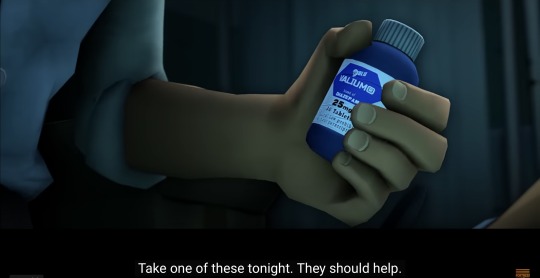
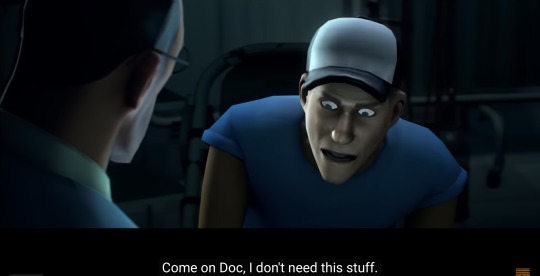
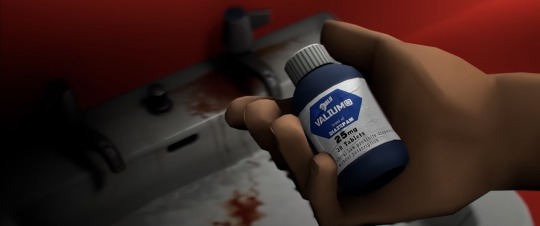
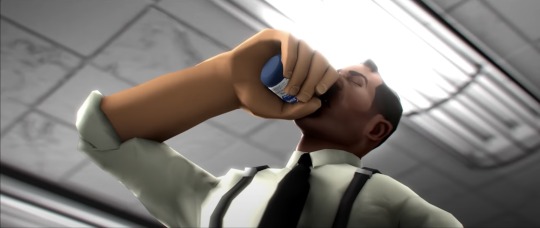

If you were Scout and your doctor friend was addicted to this medicine, you wouldn’t want to get addicted yourself. In fact, I wouldn’t be surprised if Scout theorizes that the medicine is part of the problem.
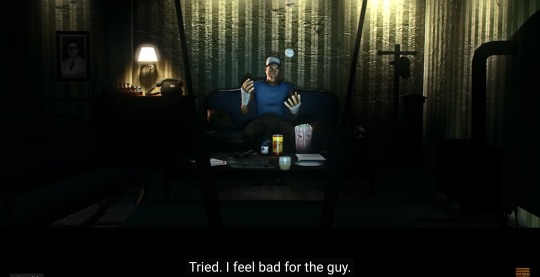
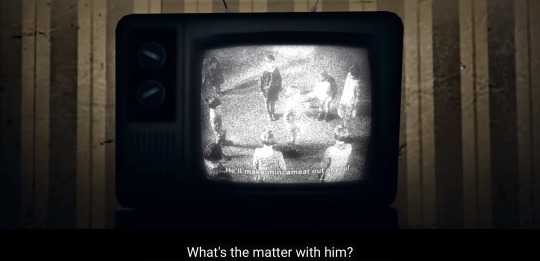
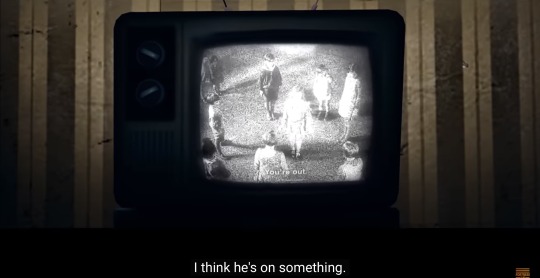
So here’s my theory on what mental health problem is plaguing BLU Medic:
Because he was roughly 6 when the N*zis took power in 1933 and Jewish, Fritz had a lot of trauma from a young age. He developed DID, formerly known as Multiple Personality Disorder [it can only develop from childhood trauma]. His parents and doctors were limited in what they could do because of the state of the country; they also thought his hallucinations of other personalities were imaginary friends.
When he escaped to America as an adult, he decided to join BLU in the hopes that other mercenaries would be willing to go fight against Germany in the war. But then the first respawn failures happened, and he got roped into being an “expert” on the issue.
Spy’s Disguise gave us a brief window into what was happening to the doctor during the respawn crisis.

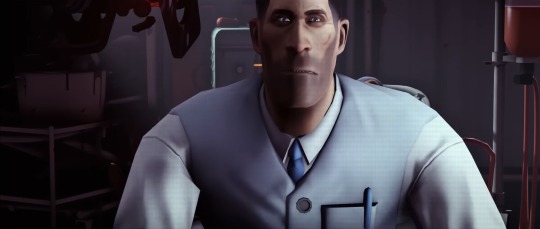
He hasn’t been sleeping well. He’s got an exposed cut on his face, a five o’clock shadow, and bags under his eyes.
He didn’t speak or blink for any of the scenes he was in, which was off putting to Engineer. He even showed them what was wrong using a VHS, not his words.
Overall, he seems aloof and unapproachable, which is different to how he acted in Em Blue.
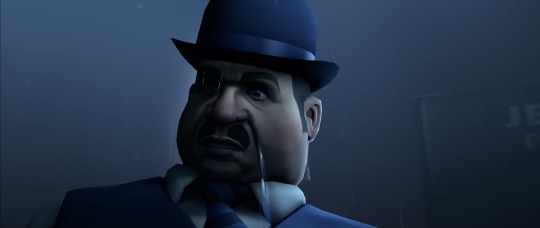
We know Jules Archibald must be a hack since Soldier and Spy had a nightmare where he’s callously letting people die for money. If he’s too posh to defend himself like he was in Spy’s perspective, he’s got to be too posh to deal with respawn failure gore.
But that wouldn’t stop him and his crew from holding Medic to a high standard when it came to his work, even if they didn't really want to spend money to fix the problem. I imagine the Administrator was the one that had to “motivate” them to allocate funds, and it would take her a while to get fed up.
So in the meantime, Ludwig developed a new, scarier personality to help him deal with Jules and new respawn failure trauma.

He was the one in control when CyberSpy was examined, and when he was given the bad news about his condition.
We know the doctor still doesn't understand his condition because of the nightmare versions of his other personalities.

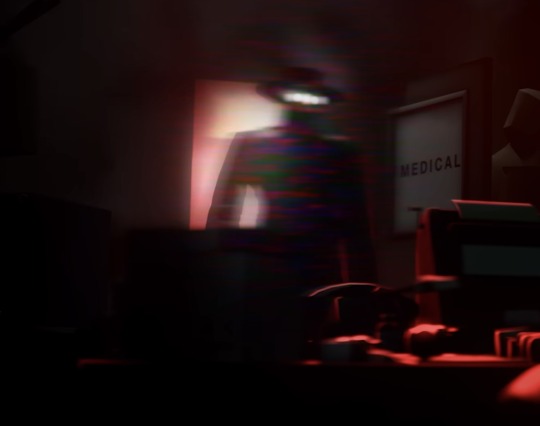
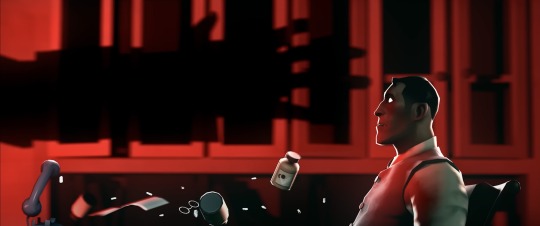
This is the nightmare version of the unblinking, mute personality from the funeral. But he’s not the only personality that Fritz is afraid of.
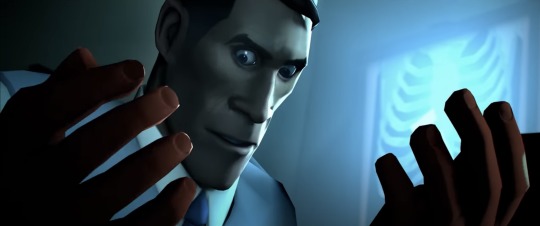
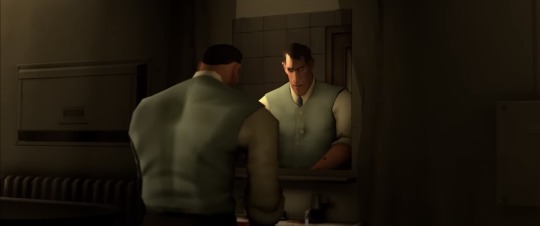
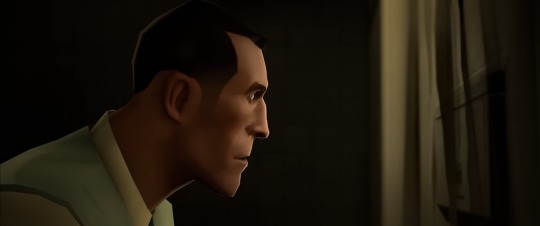
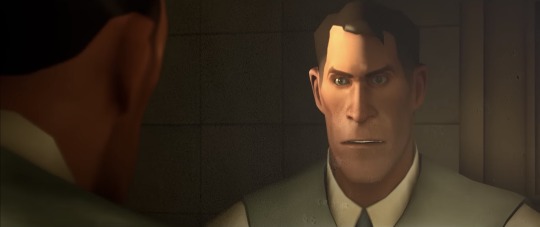

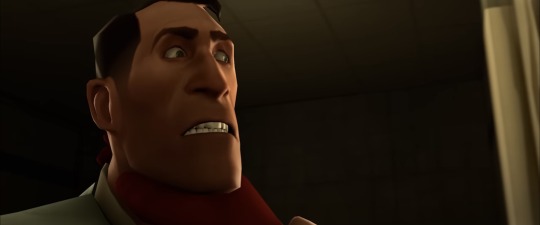

This hallucination gives us more insight into how the doctor views his other personalities. 1. They are trying to trick him and other people. Whichever one this nightmare is based off of is good at pretending to be him.
2. They hate him. He woke up with blood on his hands and no memory of why. The nightmare got angry that he tried to wash the blood off himself. It didn’t hesitate to hurt him.
3. They love violence, and they want to hurt him. This one choked him out and slammed his head into the mirror. And again, he woke up with blood on his hands.
Him unknowingly killing Scout’s Ma and kidnapping the poor guy happened because he’s afraid that these personalities want to do that. He’s afraid that they’re plotting something and biding their time, Em Blue is the manifestation of what he thinks they’re up to.
The plague doctor was reaching towards him like it was going to be fake nice, despite all of its terrifying features. He thinks that one is trying to lull him into a false sense of security.
He’s wrong about them, and we have proof. We have the actual personality that the mirror monster is based off of, and a long scene with him in control.
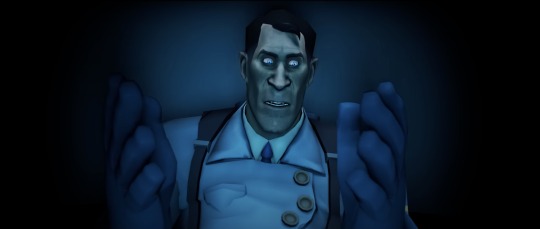
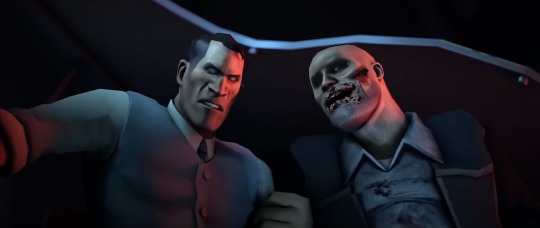
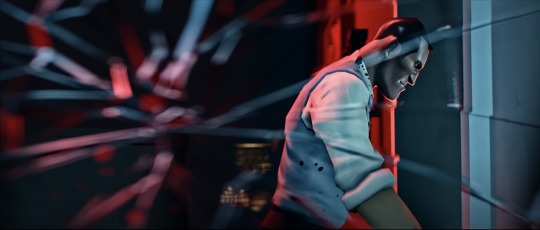
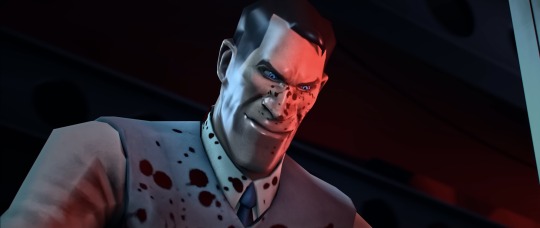
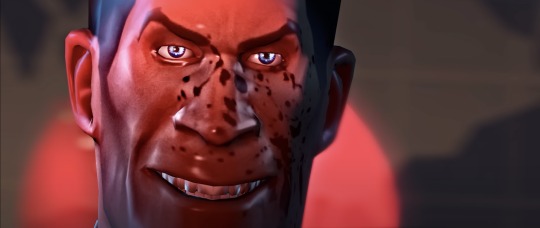
This is the personality that developed to deal with RED mercs on the battlefield. That’s why he’s so good at fighting and acts so terrifying.
Now imagine for a moment that you black out during a fight, and when you come to your team is freaking out over you. They say you started beating the RED team senseless, with a terrifying grin that nobody has seen from you before. You don’t remember any of it, and unfortunately it’s only the first of many times this will happen.
That’s Dr Ludwig’s perspective. He doesn’t know what they want. He doesn’t know what they are or how to get rid of them. They keep appearing in the corner of his office or his room, if you watch him talk to Scout in his MedBay, he keeps looking around like he expects another person to be there. He just wants it to stop, so he starts relying on Valium as a crutch.

The bottle reveal is an interesting scene to me, because Emesis Diazepam horrifies the doctor. It must be something he knows is dangerous, and he’d never take knowingly.
Here are some symptoms of long term Valium/Diazepam abuse
Persistent drowsiness
Confusion
Memory loss
Fatigue
Dizziness
Blood in urine/feces
Depression
Anxiety
Tremors
Sleeping problems
Nightmares
Hallucinations
Seizures
Here are the overdose symptoms:
Coma [can still breathe]
Bluish lips and fingernails
Blurred/double vision
Slowed/stopped breathing
Confusion
Depression
Dizziness
Drowsiness
Excitability
Hiccups
Rapid eye movement
Rash
Stomach is upset/pained
Tiredness
Tremors
Uncoordinated movement and weakness
I think the bottle reveal is meant to be a wake up call about the Valium addiction. Maybe the other personalities know he should stop taking it, we do see the quiet one standing behind him afterwards.
DID personalities develop to protect a person from their trauma and keep them safe. Sometimes these personalities can be dangerous because they believe that they are demons, evil, or that destroying the host body will just send them back to their own. People wake up parked on bridges and in other odd places because another personality took control then switched back.

But in every scene where we get to see the others in control, they appear to be trying to help Fritz, not make things worse. The quiet one was trying to keep him safe from Spy and the people at BLU that made him a scapegoat. The violent one was attacking the Engineers to try and save both Medic and Scout, and probably tried to take control at Scout’s house so he could deal with BLU Ma’s body instead.
When the ambulance crashed into the telephone pole, that was because the quiet one over exerted himself and blacked out. But remaining parked outside of Scout’s house and waking up may well have happened because of the Valium abuse. The medicine is causing more symptoms that overlap with DID, and exacerbating the distrust that Fritz feels towards the others.
This doesn’t make him a bad guy, he doesn’t know what he’s doing to himself or that the others are trying to help him. The quiet one is terrifying, and seeing him in the corner of your room would get on your nerves. Blacking out and being told about actions you don’t remember doing would be terrifying, and I don’t blame him for assuming the personalities are malicious.
Maybe it would be better for BLU Medic to keep working as BLU since it’s become home, but not as a battle Medic. First he needs to reconcile with the others and understand what they are trying to do. Then they need to work together to decide whether he should retire or stay at the familiar base. But he’s having too many issues to be fighting other mercenaries.
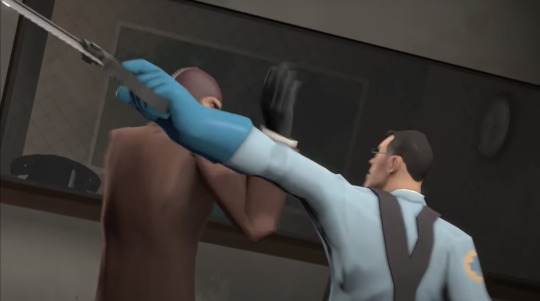
The Spies and RED Medic that looks exactly like him are just going to confuse matters more, whether they know it or not. They gotta get another BLU Medic to fight on the field, this can’t go on.
#tf2#emesis blue#character analysis#sad lad hours#emesis blue medic#emesis blue theory#Angst#medical symptoms#Not a psychiatrist
95 notes
·
View notes
Text
Is Twilight a good therapist?
[Spoilers for SxF Ch.77 if you haven't already read it!!]
I am a huge fan of seeing representation of what it's like to be in the therapy room, but there are always soooo many things that the media get wrong, and I really wanted to draw attention to Twilight's portrayal as a therapist. (This is coming from the POV of someone who works in a clinical setting in the UK/Scotland).
Before I get stuck in, I also want to make it clear that Psychiatrists and Psychologists are VERY different, and in this scene Twilight is very much acting as a Psychologist.
("What's the difference?" you may ask.
WELL:
It's easy. A Psychiatrist is trained as a medical doctor, specialising in mental disorders largely from a biology perspective, and they are qualified to prescribe drugs and medication.
A Psychologist on the other hand delivers talking therapies, and is trained to see mental health from multiple perspectives. Basically, exactly what we see Twilight doing in this scene!)
So, we have a spy who has received next to zero medical training and, as far as I can tell, has whizzed through textbooks in his spare time - no placements, no clinical training, no assessments or exams, no clinical supervisor to assist in reflection or case management.
So, how does he do?
Normalising responses to traumatic events ✅
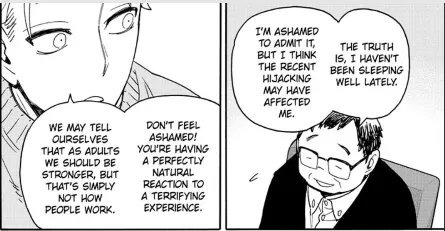
Mr Austin has done the brave thing and turned up looking for help, and Twilight/Dr Forger responds by putting his problems into context, and normalising the experience for him. We love to see it. This is SO important to trauma-informed working.
2. Providing reassurance and expectations for recovery ✅

I love this even more because what Twilight is saying is true. Only 10% of people who experience a potentially traumatic event actually develop PTSD symptoms, and of those, 70% will recover within the year. Twilight is reiterating the message that acute trauma is absolutely recoverable.
3. Teaching and demonstrating coping skills ✅

It's not enough for clinicians to simply tell their patients about coping skills, it is essential to demonstrate them too. Bringing the practice of coping skills into the therapy room is so important for helping the patient to build their skills, and to build the therapeutic alliance as well.
Here, Twilight is teaching a simple breathing technique, but I would also commend him for teaching other coping skills: grounding, distraction, progressive muscle relaxation, visualisation, and more - although all/most of these rely on breath control as a foundation.
4. Encouraging guided self-help and making medical reccommendations ✅✅
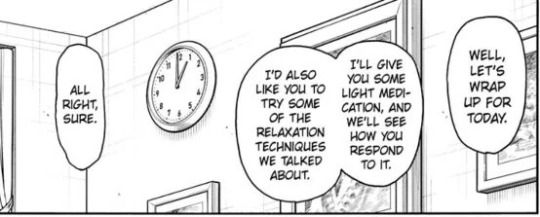
Just trying a breathing exercise once does not make recovery easy. Twilight knows it's important to encourage patients to do this in their own time.
And, finally, we see him acting as a psychiatrist, and reccommending medication. (Although, let's temporarily ignore that as a spy he has NO TRAINING in psychopharmaceuticals).
5. Breaching confidentiality ❌ Confrontational approach ❌
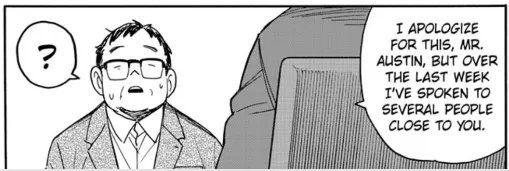
Oh, Twilight... You have fucked up. Big time. This is the biggest fuck up of the entire session.
It's his SECOND session with this patient, and not only does he take a confrontational approach (putting Mr Austin on the defensive, definitely not conducive to a good therapeutic relationship), but he has BREACHED CONFIDENTIALITY. Depending on severity this is A FIREABLE OFFENCE (even in the UK!).
6. Positioning oneself as the 'expert' ❌ Telling the patient to confront their abuser❌ Not taking into account patient's readiness for change ❌

Oh HELL no. Absolutely not. Confronting fear is a delicate and lengthy process requiring many steps, and always checking in with the patient at every step of the way. It cannot go too fast.
The therapeutic relationship is an alliance, and it's important to empower the patient to make their own choices in therapy, especially if it's something that is a source of fear.
Not only that, but telling anyone to confront their abuser is straight up the worst advice ever. It's not safe.
6.5 Providing rationale and reassurance✅
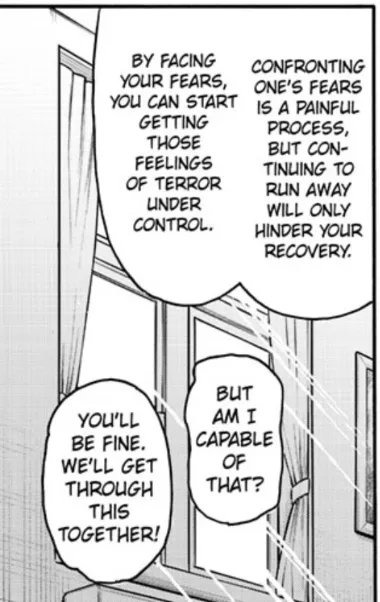
Okay, I'll concede on this point. Twilight's rationale is sound: in the 'Cycle of Anxiety', Avoidance is a key factor in maintaining one's fear of something, and it is a core criterion in PTSD. Learning how to face a fear is really important to PTSD recovery.
And it's good that Twilight attempts to reassure Mr Austin's concerns.
7. Giving unsolicited relationship advice ❌
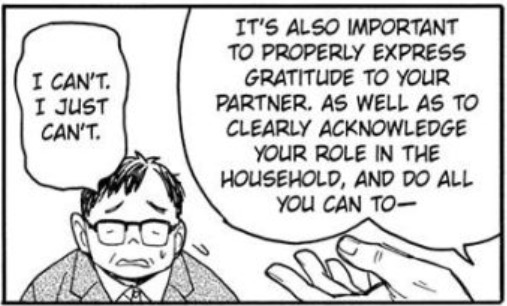
This is NOT your role, Twilight. You are outside the bounds of your job description. It's an admirable effort to connect with the patient, but, alas, not appropriate at this time.
8. Not taking risk into account ❌❌❌
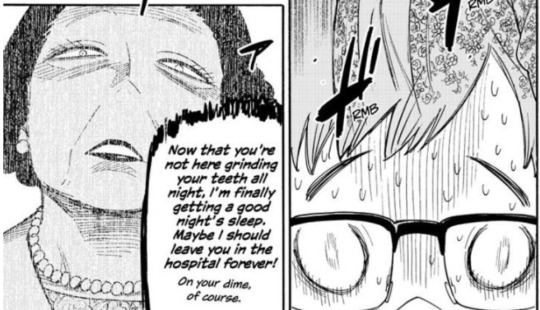
This is a BIG one. It is not normal for a person to be so afraid of their spouse to be showing all the typical symptoms of a fight-or-flight fear response (sweating, shaking, racing thoughts, muscle tension, pupil dilation, etc.), and Twilight is missing some pretty obvious cues to indicate that Mr Austin is in a clearly unsafe situation.
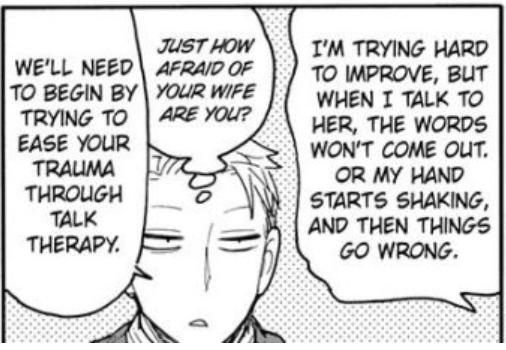
HE IS LITERALLY TELLING YOU TO YOUR FACE!!
AND if its bad enough that Mr Austin can't even speak, that means his fear is bad enough to completely shut off his pre-frontal cortex (the centre of executive function, rational thought and decision making), which means that his fear is THAT bad. Add this up with the insomnia, chronic fatigue, frequent dissociation, irritability and mood swings, and suddenly it is bad enough to be considered a trauma response - and Twilight still doesn't question the source of this trauma.
Also, Twilight, you can afford to put the judgement aside. Please.
9. Facilitating an unsafe exercise ❌ Risking psychological safety ❌
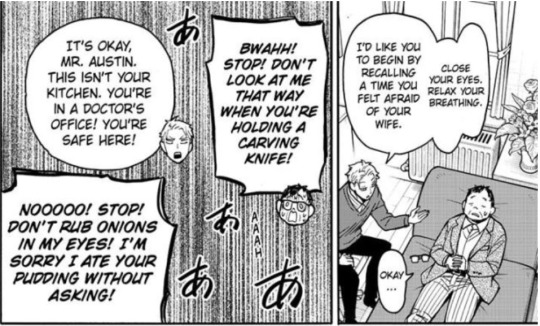
Here Twilight is attempting a basic exercise inspired by exposure therapy (which Twilight is NOT trained in because he is a spy). While it is a therapy that has a decent evidence base, you don't to therapy to a patient, you do it with them, i.e. it's a process that needs to have a clear goal with informed consent.
In this instance, Twilight didn't prepare Mr Austin for the exercise, and he ended up in an actual flashback with very high levels of emotional distress. Unsafe.
And, again, psychiatrists do not typically deliver talk therapy - that is the job of psychologists.

Conclusion
Why did I make this thread?
I'm really happy that Endo put in the effort to illustrate a really interesting therapy session, bringing psychology and trauma into the forefront. These are sensitive topics and I applaud Endo for giving a really complex topic airtime, and doing the research into what a proper therapy session looks like - because, for all my criticisms here, it is a pretty decent represention of what therapy can look like. [Especially the good bits!]
I also think this scene/chapter alone does a great job of reducing the stigma of seeking help for mental illness. It's great to see in mainstream media, especially something as popular as Spy x Family, since Japan does have a high suicide rate and intense stigma for those suffering from mental illness.
However, I still felt the criticisms of Twilight's therapy session were important to voice.
We cannot forget that he is not a trained clinician. He is there to gather information on his patients and their families and connect him to the upper classes, which explains his confrontational approach and disregard to psychological safety.
As much as Twilight has truly absorbed the psychiatry textbooks and committed their content to memory, the effects of the lack of training is obvious, showing up as major errors in his clinical practice - some of which could get him fired in today's system.
TL;DR Twilight is a GREAT spy. But a therapist? Not your calling, my friend.
#initially posted on Twitter#somehow I am compelled to bring this up#sorry I guess#spy x family#twilight sxf#thanks for listening#sorry for this massive rant#let me know your reflections idk
110 notes
·
View notes
Text
Doctors in New Brunswick say forcing LGBTQ students to see a psychologist, as suggested by changes to Policy 713, could create bias and discrimination. The New Brunswick Medical Society made a submission to Child, Youth and Seniors’ Advocate Kelly Lamrock about the new requirement for children under the age of 16 to see a psychologist or school professional if there is an expression related to gender identity or sexual orientation. “One thing I heard from professionals, which is, don’t pathologize the normal questions,” Lamrock said, speaking with reporters on Tuesday. “Saying to a child right away, if you’re questioning your identity, we better get you to a psychologist — if you can even find one — is something that plays into that perception of mental illness which is simply not true.” The submission said “following a comprehensive review of scientific literature, this group of physicians expressed significant concerns regarding the apparent absence of clinical and expert advice regarding the changes made to Policy 713.” “Furthermore, it was stressed that the review directly contradicts international medical recommendations and has the potential to negatively impact children and youth in New Brunswick who are exploring their sexual orientation or gender identity as part of a normal and healthy development process.”
Continue Reading.
Tagging: @politicsofcanada
129 notes
·
View notes
Text
Kiss of Death pt. 4
Anthony Bridgerton x Assassin!Reader
Society has certain expectations of you. If only they knew of your nighttime activities…

That, as it were, was not possible.
Viscount Bridgerton was only afforded a couple of extra hours of sleep following your late night encounter. He still rose relatively early, only to find out from his mother that you had left nearly half an hour ago with an apology and a promise to meet them at the ball that evening.
You were in a rush for the rest of the day.
Unfortunately, sleep rarely found itself in the silent hours of the night, and when it did, it was fitful. You couldn’t rest, not until you completed your mission. So, you were run ragged by the time the evening approached.
Business was not as usual, and you didn’t know when the London brotherhood had descended into such chaos, but you imagined the famous Edward Kenway might’ve had something to do with it.
His house had been a makeshift headquarters for the time being, and you’d been hard at work establishing both targets and allies.
Being a prominent member of society, however, came with certain expectations. Even a princess couldn’t publicly denounce societal norms, at least not so boldly, but especially not while trying to maintain anonymity.
The Templars had been amassing power in London for some time, and with the brotherhood as desecrated there as it was, you needed to remain unknown.
Which is exactly why you found yourself cursing God above as you tried to re-stitch the gash in your side. The injury was from the night before, but Graham, the resident medic, had stitched it together. In your hurry to return to the Bridgerton home for the ball, you’d ripped them back open.
Now, you were certainly no medical expert, but you’d had to resort to crude stitches a number of times before to prevent yourself from bleeding out. A part of you was thankful for the modest rhetoric of present society, if only because it shielded the many scars a lifetime of fighting had earned you.
Silvery lines mapped your skin, different shapes and sizes, coalescing to a single story of the life you lead. It was a hard life, almost always dangerous, and mentally demanding, but in a world that tried to tie your life value to your marriage prospects, you were damn proud of it.
A knock interrupted your musings, and you cursed loudly as you whipped around to face the intruder, a knife in your hand before you could logically reason that an attacker would decidedly not knock.
Benedict Bridgerton, the middle son, held both hands up in surrender, his eyes blown wide as he took in the scene before him. At first, common etiquette took over, and he apologized for interrupting, and turned away to protect your decency.
Then, he seemed to process what he actually saw.
“I’ll get the doctor,” he proclaimed, already a step out the door.
You didn’t let him get any further.
Mindful of your wound, and the single stitch that still needed to be fully patched up, you vaulted over the bed.
“No doctor,” you stopped him, pulling him back into the room with a force he didn’t know you were capable of, and then leaning against the door.
He opened his mouth, eyes blown wide in surprise, then closed it once more.
“Pardon my indecency,” you spoke eloquently, gesturing to the bloody mess on your torso. You weren’t fully bare, but you were certainly missing a few layers.
“I really think you need a doctor,” Benedict argued, no longer shielding his eyes. “How did-“
“I will explain,” you promised, forcing his gaze to yours. “Everything. But I need to get to the ball.”
“Maybe that’s not-“
“Benedict,” you interrupted sternly, presenting the needle and thread you were using in one hand. “I promise that I’m fine, but if I don’t make it to the ball soon, I will have bigger worries.”
He looked like he wanted to argue, that he needed to advocate for your health. Instead, he sighed, then nodded.
“What do you need?”
“An escort, for one,” you grinned, pointing to the intricate dress you’d laid out earlier. “And discretion. I’ll tell you everything, but you have to promise you won’t breathe a word to another soul.”
Benedict mulled over the proposition, as he leaned against the bedpost and watched with a morbid fascination as you threaded the last stitch in.
“As long as there’s no danger to my family, I can keep a secret.”
You flashed him a smile, then fixed your slip to the proper position.
“First order of business, I need help with this corset.”
He raised a brow, sure you were joking. When it became evident that you were absolutely serious, his smile faded.
“What would the lords and ladies of the ton think of this?” Benedict teased, helping you dress in the lavish gown you had chosen for the ball.
“I’m sure,” you grunted as the pressure of the corset pushed against the wound, “They’d disapprove of a great many of my hobbies.”
“Having men dress you is a hobby, then?”
There was an easy air between the two of you, like you were fast friends. It reminded you of the stark difference between him and his older brother. Where you could joke along with Benedict easily, every interaction with Anthony was charged, electric even.
“Quite the opposite,” you hummed, and Benedict laughed loudly.
Fast friends, indeed.
You were sure if it were any other Bridgerton, there would be more questions and demands. You were also sure they’d be a little more sober.
But, as it were, Benedict was exactly who you needed at the present. He offered help with no judgment and little questions.
There would be a time and a place where you owed him both, but for now your objective was set, and Benedict certainly didn’t get in your way.
The carriage ride to the ball was tense, at best, and suspicious, at worst. Your fingers flexed against the deep red fabric of your gown, and even through the many, many layers of finery, you felt the pressure upon your leg.
Still, Benedict remained silent, his mouth pulled in a tight line. It was difficult for him to do so, but he held his tongue. For an inexplicable reason, he believed you would tell him the truth, and that was enough to earn his silence.
“Will you be my first dance, Benedict?”
Your voice was gentle against the harsh squeaking of the old carriage. One corner of his lips pulled up in a crooked smile, the street lamps twinkling in his eyes.
“I would be delighted.”
You breathed a laugh, enjoying the last few moments of peace before braving the storm. Despite what your refined birth might suggest, you would never be accustomed to the duties you had as Princess. In a ballroom, you played the part you had to perfectly, but it would only ever be an act. You never felt more like yourself as you did when you had your gear on, hurdling towards the earth in a leap of faith, trusting your judgment and quick wit to grant you a safe landing.
The beating of your heart, the widening of your eyes, the perfect control over your muscles; it made you feel alive.
All too soon, the great pillars of the Craven estate towered outside, signaling your arrival at the ball. The carriage slowed to a stop, the halting of the jostling a minute reprieve from the ache on your abdomen.
Just smile.
Your lips tugged up- not with unbridled joy, but rather polite disinterest- as you took a steadying breath. Benedict got out first, scanning over your features quickly before he extended a hand, helping you out.
You didn’t wince, didn’t even move a muscle, as the new stitches pulled uncomfortably, a dull ache settling against your ribs.
“That’s incredible,” Benedict commented under his breath, leading you past the stragglers outside.
You were late to the ball, but fashionably so. Some of the more aggressive mamas were fixing their daughter’s hair or gowns before they entered. They all dropped to a curtsy as you walked by, murmuring about your dress.
“What is?” You inquired, not even sparing him a glance.
Your shoulders were straight, your head held high. Years of instincts made sure you took particular note of your surroundings, and escape routes if need be, but to everyone else you looked calm- content even- as you glided towards the doors, the intricate train of your dress nearly dragging on the ground. The bodice of the dress looked to be made of red rose petals, their overlapping covering from your wrist to your waist, then cascading down over the layers of red silk. The gown left your shoulders exposed, and just enough cleavage to be deemed tasteful. The placement was careful enough to avoid any noticeable scars, while still being tantalizing to the eligible men.
If only they knew.
“It is truly impossible to tell the position you were in just moments ago.”
The curve of your lips pulled up a little more.
“Everyone has their secrets, Benedict,” you replied quietly, muttering a thanks as the door was opened for you and him. “Some are just better at hiding it.”
As you and the middle Bridgerton boy descended the stairs into the sparkling marble ballroom, the music paused, and they all turned to stare at you.
The queen wasn’t present, luckily. Your father had sent a letter in advance to her, so that it wouldn’t be seen as disrespectful when you didn’t visit her first. You would have to make a royal visit sooner rather than later, but, ironically enough, you tried to avoid royalty. In your experience, too many had been direct supporters of the Templar cause.
You identified as many people as you could- and those you couldn’t, you assessed what sort of threat they might pose. Even as the music resumed and the hushed whisper that’d fallen over the ball had all but dissipated, you found the noise faded to the background.
Somewhere in the chaos of your thoughts and the murkiness of your fear Benedict slipped a dance card around your wrist.
The eyes of paintings seemed to watch you and the expansive ceilings closed in, suffocating you in a way you’d been before.
28.
28 possible escape routes.
The thought was enough to calm the fear swelling in your heart. Once, you would’ve been just as comfortable in the crowd. Once, you were fearless.
Then, your mother…
The dark eyes of Viscount Bridgerton dragged you out of your mind before you could be swept up in the current of memories as he approached you. He bowed deeply, but his gaze didn’t stray.
Hot desire burned there, his eyes slow to draw your figure. He tried to conceal it, like he, too, was startled by the air that crackled with intensity between you.
“I was starting to think you’d decided to forgo tonight’s ball as well.”
There was such a simple curiosity in his words that you couldn’t contain the gentle laughter that bubbled to your lips.
“I suppose I have been rather absent.” You admitted, casting a glance to your escort. “Alas, your brother promised me a dance, so I simply had to attend.”
The frown on Anthony’s mouth could be categorized as suspicious, but Benedict shot him a wink and swept you away, mindful of your hidden injuries.
“I dare say,” Benedict leaned in conspiratorially, one hand placed in yours while the other rested on the small of your back. “You’ve caught Anthony’s interest.”
“His interest?” You echoed, a brow arched. “Or his ire?”
Where Benedict’s moves were graceful and practiced, yours were fluid- the dance of someone who was familiar with precise movements. You were sure you made quite the spectacle, even more so to the eyes of men who wished to marry the rich and beautiful.
“Perhaps,” Benedict laughed, spinning you with ease, “they are not so different.”
Even with the series of spins you performed, you managed to catch Anthony’s stare with each turn of your body. It would’ve been impossible not to, considering his attention had yet to leave you.
“I do believe we’ve managed to anger your brother without a word,” you slyly mentioned, bowing to Benedict as the crescendo drew to an end.
He returned the gesture, flicking a quick look to where you’d stitched your wound together earlier.
“The poets might call that jealousy,” he said, nodding in his brother’s direction, as if to dismiss the conversation.
You hesitated briefly, swallowing against the guilt and anxiety in your throat, before offering a friendly squeeze of your hand.
Tomorrow.
You would tell Benedict the entirety of the truth tomorrow.
Tonight, however, you had a role to play.
You squared your shoulders, raising your head high as you began walking confidently, steadily, in the direction of Anthony Bridgerton. The steel of the twin daggers you concealed against your thighs burned, a gentle reminder of the life you lead.
Anthony was dangerous.
His eyes made you weak in the knees, a bit too much like the lady you were expected to be. He was an attractive man, sinfully so, and you found yourself inexplicably drawn to him.
Perhaps it was the way he challenged you. Or, perhaps, your mind was simply clouded by a haze of lust.
Whatever the case may be, you would not fall so easily to his charms.
“Princess,” Anthony greeted, very obviously shooting his brother a look first.
“Viscount Bridgerton,” you answered, a teasing smile on your lips.
His eyes narrowed a fraction, tension in his brow as he tried to decipher what you could possibly be feeling at the moment. He wouldn’t be able to tell, though. Years and years of training, of learning to wear the mask that most suited you, made you impossible to read.
“You owe me a dance.”
You blinked.
You hadn’t expected him to be so bold. Then again, Anthony, it seemed, had a habit of catching you off guard.
“I don’t recall ever owing you anything,” you shot back evenly, unable to stop yourself from playing into his game.
“You stay in my family home,” he reminded you, mirth shining in those soulful eyes of his.
“Are you suggesting I find other arrangements?” You couldn’t keep a straight face, cursing yourself as a sultry smile spread on your lips.
“No,” he noted the flock of men waiting for your conversation to end so that they might engage with you. “But I am keeping your suitors at bay. Surely, that warrants a dance.”
Your eyes didn’t need to leave his to notice the men congregating a polite distance away, patiently awaiting a chance to speak with you, or perhaps dance. Either way, you didn’t want to. In this case, you didn’t have much of a choice, appearances and all that.
“My knight in shining armor,” you deadpanned, biting your lip to keep from laughing.
“A dance then?”
There was a hopefulness there, and a part of yourself you thought you’d long since abandoned twinged desperately.
“Patience, my dear Anthony, is a virtue,” you ran your tongue along your teeth, watching his gaze flick down, tracing the movement with his eyes.
“Perhaps we should tell that to them.”
His smile widened mischievously, and before you could question why, he waved over the nearest suitor. The tall blonde-haired gentleman looked startled, before he rushed over to introduce himself and place his name on your dance card.
You glared at Anthony over the man’s shoulder, physically restraining yourself from doing something childish like sticking your tongue out at him when he had the audacity to shrug.
The rest of the ball continued in a similar manner. Anthony watched on as suitor after suitor approached, all far too eager for your attention. He ignored the twinge of jealousy, telling himself over and over that he didn’t want you in any manner, and therefore he had no reason to feel envious of all the men holding you throughout the night.
It didn’t help, of course, but he’d gotten decent at burying his feelings deep beneath his own stubborn ideas.
“You didn’t ask her to dance,” Daphne noted beside him, leaving her own entourage of suitors.
He knew that look she was giving him. It was the same look his mother gave him before she meddled in his business. It seemed Daphne had inherited a carbon copy of that expression.
“I would think, dear sister, you have your own dances to worry about.”
Daphne smiled thoughtfully.
“It’s okay to like her,” she replied kindly.
The soft tone, and unexpected observation, caused Anthony to stare at his sister for a moment. A moment too long, considering she left him in his confusion, offering no further explanation.
The rest of the night he was left in silence, a lonely shadow watching over the bright ambience. He felt starkly out of place, and was reminded once again that he felt constrained, rather than freed, by the responsibilities on his shoulders.
He released a quiet breath, lingering near his mother as the night drew to a conclusion. You were lost somewhere in the fray, and, much to his displeasure, he couldn’t seem to find you.
When he began to usher his family home, he noted with some amount of curiosity that you had already left, disappeared with only a quick explanation to Daphne.
He felt a knot tighten in his stomach.
Surely, you hadn’t snuck away with a suitor, right? The thought was unpleasant, so much so that the sour look on his face kept his family from engaging with him on the carriage ride home.
He had hoped that perhaps you would stop by late into the night, as you had previously, but Anthony slept through the night with no interruptions.
Tag List: @mysticwitchcraftco @ajanauia @khaleesihavilliard @kariiiel @owenniasstars
#anthony bridgerton x reader#anthony bridgerton imagine#anthony bridgerton x female reader#anthony bridgerton x you#bridgerton x reader#bridgerton x you#bridgerton imagine
195 notes
·
View notes
Text
By: Azeen Ghorayshi
Published: Oct 23, 2024
The leader of the long-running study said that the drugs did not improve mental health in children with gender distress and that the finding might be weaponized by opponents of the care.
An influential doctor and advocate of adolescent gender treatments said she had not published a long-awaited study of puberty-blocking drugs because of the charged American political environment.
The doctor, Johanna Olson-Kennedy, began the study in 2015 as part of a broader, multimillion-dollar federal project on transgender youth. She and colleagues recruited 95 children from across the country and gave them puberty blockers, which stave off the permanent physical changes — like breasts or a deepening voice — that could exacerbate their gender distress, known as dysphoria.
The researchers followed the children for two years to see if the treatments improved their mental health. An older Dutch study had found that puberty blockers improved well-being, results that inspired clinics around the world to regularly prescribe the medications as part of what is now called gender-affirming care.
But the American trial did not find a similar trend, Dr. Olson-Kennedy said in a wide-ranging interview. Puberty blockers did not lead to mental health improvements, she said, most likely because the children were already doing well when the study began.
“They’re in really good shape when they come in, and they’re in really good shape after two years,” said Dr. Olson-Kennedy, who runs the country’s largest youth gender clinic at the Children’s Hospital of Los Angeles.
That conclusion seemed to contradict an earlier description of the group, in which Dr. Olson-Kennedy and her colleagues noted that one quarter of the adolescents were depressed or suicidal before treatment.
In the nine years since the study was funded by the National Institutes of Health, and as medical care for this small group of adolescents became a searing issue in American politics, Dr. Olson-Kennedy’s team has not published the data. Asked why, she said the findings might fuel the kind of political attacks that have led to bans of the youth gender treatments in more than 20 states, one of which will soon be considered by the Supreme Court.
“I do not want our work to be weaponized,” she said. “It has to be exactly on point, clear and concise. And that takes time.”
She said that she intends to publish the data, but that the team had also been delayed because the N.I.H. had cut some of the project’s funding. She attributed that cut, too, to politics, which the N.I.H. denied. (The broader project has received $9.7 million in government support to date.)
Dr. Olson-Kennedy is one of the country’s most vocal advocates of adolescent gender treatments and has served as an expert witness in many legal challenges to the state bans. She said she was concerned the study’s results could be used in court to argue that “we shouldn’t use blockers because it doesn’t impact them,” referring to transgender adolescents.
Other researchers, however, were alarmed by the idea of delaying results that would have immediate implications for families around the world.
“I understand the fear about it being weaponized, but it’s really important to get the science out there,” said Amy Tishelman, a clinical and research psychologist at Boston College who was one of the study’s original researchers.
Dr. Tishelman also noted that, even if the drugs did not lead to psychological improvements, they may have prevented some of the children from getting worse. “No change isn’t necessarily a negative finding — there could be a preventative aspect to it,” she said. “We just don’t know without more investigation.”
In the 1990s and 2000s, doctors in the Netherlands began studying a small group of children who had experienced intense gender dysphoria since early childhood. For most of these children, the negative feelings dissipated by puberty. For others, puberty made them feel worse.
For those who struggled, the researchers began prescribing puberty blockers, which had long been used to treat children whose puberty began unusually early. The Dutch scientists reasoned that by preventing the permanent changes of puberty, transgender adolescents would fare better psychologically and fit in more comfortably in society as adults.
In 2011, the researchers reported on the first 70 children who were treated with the so-called Dutch Protocol. The children were thoroughly assessed to make sure that they had persistent dysphoria and supportive parents and that they did not have serious psychiatric conditions that might interfere with treatment.
These patients showed some psychological improvements after puberty blockers: fewer depressive symptoms, as well as significant declines in behavioral and emotional problems. All the patients chose to continue their gender transitions by taking testosterone or estrogen.
The findings were highly influential even before they were published, and clinics around the world opened to treat transgender adolescents with puberty blockers and hormones.
England’s youth gender clinic in 2011 tried to replicate the Dutch results with a study of 44 children. But at a conference five years later, the British researchers reported that puberty blockers had not changed volunteers’ well-being, including rates of self-harm. Those results were not made public until 2020, years after puberty blockers had become the standard treatment for children with gender dysphoria in England.
In 2020, Dr. Olson-Kennedy’s group described the initial psychological profile of the children enrolled in the U.S. study of puberty blockers, whose average age was 11. Before receiving the drugs, around one quarter of the group reported depression symptoms and significant anxiety, and one quarter reported ever having thoughts of suicide. Eight percent reported a past suicide attempt.
In a progress report submitted to the N.I.H. at that time, Dr. Olson-Kennedy outlined her hypothesis of how the children would fare after two years on puberty blockers: that they would show “decreased symptoms of depression, anxiety, trauma symptoms, self-injury, and suicidality, and increased body esteem and quality of life over time.”
That hypothesis does not seem to have borne out. “They have good mental health on average,” Dr. Olson-Kennedy said in the interview with The New York Times. “They’re not in any concerning ranges, either at the beginning or after two years.” She reiterated this idea several times.
When asked in follow-up emails to clarify how the children could have good initial mental health when her preliminary findings had showed one quarter of them struggling, Dr. Olson-Kennedy said that, in the interview, she was referring to data averages and that she was still analyzing the full data set.
Dr. Hilary Cass, a pediatrician who this year published an extensive review of youth gender services in England, said that the delays from the American and British research groups had led the public to believe that puberty blockers improved mental health, even though scant evidence backed up that conclusion.
“It’s really important we get results out there so we understand whether it’s helpful or not, and for whom,” Dr. Cass said.
Her report found weak evidence for puberty blockers and noted some risks, including lags in bone growth and fertility loss in some patients. It prompted the National Health Service in England to stop prescribing the drugs outside of a new clinical trial, following similar pullbacks in several other European countries.
An N.I.H. spokesman said that while the agency generally encourages the publication of data supported by its grants, researchers decide how and when to do so.
Dr. Olson-Kennedy’s collaborators have also not yet published data they collected on how puberty blockers affected the adolescents’ bone development.
But many other papers have been published from the wider N.I.H. project, including a 2023 study of older transgender and nonbinary adolescents who took estrogen or testosterone to aide their gender transition. After two years on hormones, the volunteers showed improvements in life and body satisfaction, and patients taking testosterone showed declines in depression and anxiety. (Two of the 315 patients died by suicide, a rate much higher than the general population.)
Dr. Olson-Kennedy noted that doctors’ clinical experience was often undervalued in discussions of research. She has prescribed puberty blockers and hormonal treatments to transgender children and adolescents for 17 years, she said, and has observed how profoundly beneficial they can be.
Although the N.I.H. studies are large, she said, “these are minuscule compared to the amount of people that we’ve taken care of.”
==
This is fraud. When scientists - or, perhaps, people who simply "identify" as scientists - are given public money, they work for the public. They have no business hiding the results or trying to manipulate it to conform to their ideological commitments.
"I do not want our work to be weaponized."
What she's saying is that she doesn't want reality to be used against her ideology.
When the John Templeton Foundation, an unabashedly Xian organization, spon.sored "Study of the Therapeutic Effects of Intercessory Prayer (STEP) in cardiac bypass patients: A multicenter randomized trial of uncertainty and certainty of receiving intercessory prayer" but found that prayer was worse than ineffective, they still published it as they had to.
https://www.sciencedirect.com/science/article/abs/pii/S0002870305006496
Conclusions Intercessory prayer itself had no effect on complication-free recovery from CABG, but certainty of receiving intercessory prayer was associated with a higher incidence of complications.
Reminder that this is the same woman who said of adolescent mastectomies that, "if you want breasts at a later point in your life, you can go get them."
#Azeen Ghorayshi#Johanna Olson Kennedy#puberty blockers#gender affirming care#gender affirming healthcare#medical corruption#medical malpractice#medical scandal#academic fraud#religion is a mental illness
9 notes
·
View notes
Text
DID controversy curiosity
This is going to be controversial and potentially triggering. Before anyone gets upset, please read carefully.
I was listening to a professor of psychology at Yale (I will not give their name) making the argument that Dissociative Identity Disorder is not an actual mental health condition. This confuses me, it's in the DSM-V, there seem to be documented cases of this, and many people say they are suffering from this condition.
This professor stated that DID is a phenomenon that has been blown out of proportion and is not a treatable condition. They went on to say that clinicians have over-diagnosed this condition and people claiming to have it have somehow been indoctrinated into the belief that they really have this condition through media or even through suggestion by the clinician.
The professor said that clinicians have persuaded patients through false memories of having prior traumas that they didn't actually experience, thus convincing clients of memory loss, identity confusion and dissociated states, and said this malpractice was a serious problem in the 1980s through the early 2000s.
This professor likened DID to the phenomenon of demonic possession, in that within certain cultural settings is it acceptable to make a claim that one has been possessed by demonic entities and people don't question the validity of that claim because demonic forces are an accepted belief within the culture.
With just a preliminary search of the topic, it seems to be a hotly debated issue in the psychiatric community.
There are several interesting things to think about on both sides of the argument. I don't have enough information to formulate my own opinion, yet, and I may never be able to formulate an opinion, but I'm very curious about what this professor doesn't agree with about the validity of this disorder and if those disagreements are in any way founded.
On the one side, belief does dictate experience to a degree, hence the acceptable nature of claims of demonic possession within certain cultures; but experience also dictates belief, so that needs to be reckoned with as well.
On the flip side, the condition has apparently been documented enough to be incorporated into the DSM-V and individual experience is not something to be dismissed or taken lightly; but false memories have been demonstrated to be simple to incorporate into an individual's belief system when they are already in an insecure and vulnerable state of mind, like in a therapeutic setting.
I'm going to do my own research and read as many studies, white papers and case notes that I can get access to. Any insights would be greatly appreciated.
This entire endeavor is potentially objectionable, I do understand; and I do empathize and know it can be very frustrating to see that even within the medical community itself, the validity of certain disorders is debated. Individuals have their own biases and shortcomings. Doctors are not all-knowing; they are still fallible human beings.
Again, I do not have an opinion one way or another, I do not have personal experience in this particular diagnosis, I'm not an expert, and I do not discredit anyone's personal experience. I'm just curious and this platform may or may not be a place to get some insight, so I'm just throwing it out there.
#disociative identity disorder#mental health#mental wellness#mental health awareness#mental illness#psychology#mental health matters#psychiatry#disorder
11 notes
·
View notes
Note
Hi sex witch, I (cis man, late 20s) have a bit of an issue regarding medication and my sex life... I'm hoping you can be a bit of a sounding board for me?
I recently started taking an SNRI to help with anxiety and sleep. It seems to be working (not perfectly, but there's definitely a pretty big improvement).
Currently I'm single and all my sex is solo, but I've noticed that since I started the meds my libido has significantly reduced. It's also more difficult to reach orgasm, and the orgasms feel... different? (Not sure how I feel about that bit...)
My main problem is trying to work out whether I want to raise this with my doctor when I go for my next check-up. I'm not in the market for sex with anyone else right now, so the only person it is affecting is me. The positives in terms of my anxiety are great, and the negatives are more "differences" than actual "negatives".
What do you think? Should I push to try a different medication before I get settled on this one? Or should I spend more time working out whether I'm comfortable with the lower sex-drive? I think both are reasonable, and I would appreciate your opinion - thanks!
hi anon,
PREFACE: I'M NOT ANY KIND OF DOCTOR AND THIS ISN'T MEDICAL ADVICE.
I just want to start by commending you for noting the difference between "different" and "negative." people are often taught to think of any change in their sexual function as automatically bad, when in fact it's often nothing more than a very natural fluctuation within their body.
in your case, that fluctuation is very common; many people report experiencing a decrease in libido after beginning anti-depressants. hormones drive much of our sexuality, and anti-depressants wreak havoc on our the delicate chemical balance in our brain - for the better, of course, because they ideally help bridge the gap for chemical deficiencies in our brains that make us feel Not So Good, but as a side effect functions like the libido can be thrown into a spiral.
it's worth noting that the change often isn't permanent; eventually, your body may very well acclimate to the new hormonal arrangement and gets back to business as usual. I can personally attest that my first year on anti-depressants saw my libido pretty much go dormant, but it eventually came back with a vengeance.
I'm not in any way, shape, or form an expert on how the brain works and how medication works in the long term, but as someone who spends a lot of time talking to people about sex and has been on anti-depressants for years, I have to wonder if part of the sex drive's return has to do with the effectiveness of the medication over time. many people have a hard time fully accessing their sexuality when they're suffering from stress, anxiety, and depression, because being horny - let alone actually having sex - requires an amount of mental space and energy that just isn't there when you're struggling to even perform the basic tasks that let you get through the day. again, speaking from personal experience, I know that before I was medicated, WAAAAAAY too much of my energy was getting burned up by my anxiety and the accompanying physical symptoms; there's not much left over for libido when all of you're exhausting yourself shaking and otherwise being a nervous wreck. turns out being horny is WAY EASIER when you aren't constantly on edge!
I will also point out that sometimes the reason people who aren't doing so great in regards to their mental health masturbate so much is for those sweet little dopamine hits that they're not getting anywhere else, which I don't say to stigmatize jerking off while mentally ill (god knows I can't judge for that) but to point out that after a few months with more managed anxiety, you may not even be as interested in solo sex as you previously were. or you will be, but it will look different thanks to the other positive effects your medication has had. sexuality is a slippery creature, and it's impossible to predict exactly how it will shift throughout our lives.
my point being, if you haven't noticed any other adverse side effects of this medication and you think it's going to help more than hinder you, I would recommend continuing with it for the time. you'll keep reaping the positive benefits in the meantime, and you'll have some time to reflect on those changes as they continue to happen and figure out how this new shape your sexuality has taken can still fit into the overall mosaic of your life. if you ultimately decide that you don't like what's changed, that's fine! but I would broadly advise waiting it out through the most dramatic shifts that will happen early on to get a fuller picture.
42 notes
·
View notes
Text

A woman who was pumped with testosterone and underwent hormone therapy when she was a young teenager is suing both her doctors and the American Academy of Pediatrics, which her lawyers say has knowingly lied about the impact of the radical sex-change treatments it recommends, according to a copy of the lawsuit obtained exclusively by The Daily Wire. Isabelle Ayala, now a twenty-year-old woman, had just turned fourteen when she was committed to the hospital for suicidal thoughts, according to the lawsuit. It was during this hospital stay that she met with Dr. Jason Rafferty, who during his first brief meeting with Ayala determined that she “meets criteria to consider hormonal transition,” with the only stated obstacle being parental consent. The lawsuit states that Rafferty and other doctors sent Ayala down the “path of ‘gender-affirming’ medicalization” rather than addressing the true roots of her mental health problems — six months into her testosterone treatments, Ayala tried to commit suicide. The treatments, however, continued, until Ayala moved away from Rhode Island and decided to quit them “cold-turkey.” Now comfortable with her gender, she regrets what the doctors did to her, the lawsuit says. “Isabelle is now twenty years old and longs for what could have been and to have her healthy, female body back,” it says. “The changes the testosterone have had on her body are a constant reminder that she needed an unbiased medical expert willing to evaluate her mental health and provide her the care she needed, rather than a group of ideologues set on promoting their own agenda and furthering a broader conspiracy at her expense.” The lawsuit not only goes after the doctors who treated Ayala, but also the American Academy of Pediatrics, where Rafferty and his colleagues worked to publish a now-infamous policy statement advocating for aggressive gender treatments for children. Lawyers for Ayala say the policy statement laid the groundwork for an “entirely new model of treatment” based on “outright fraudulent representations” of scientific proof. ... Ayala is “an unfortunate victim of a collection of actors who prioritized politics and ideology over children’s safety, health, and well-being,” the lawsuit filed on her behalf states. She had suffered with her mental health ever since being a victim of sexual abuse, long before she began entertaining the idea of gender transition as a solution to her depression. The lawsuit says that Rafferty, Forcier, and other doctors failed to even consider other options to address her mental health before putting her on an aggressive hormone and testosterone regimen. Ayala told her doctors that she was concerned about losing the ability to give birth, but they put her on the treatments anyway, without disclosing the potential harm the drugs administered could have on the reproductive system. The lawsuit says that Ayala is worse off now than before she was treated by the doctors, and asks that they be held “accountable for their wrongful acts.” “Isabelle has suffered from vaginal atrophy from the extensive use of testosterone; she deals with excess facial and body hair; she struggles with compromised bone structure; she is unsure whether her fertility has been irreversibly compromised; she still has mental health issues and deals with episodes of anxiety and depression, further compounded by a sense of regret; and she has since contracted an autoimmune disease that only the males in her family have a history of,” the lawsuit explains.
Emphasis are mine
34 notes
·
View notes